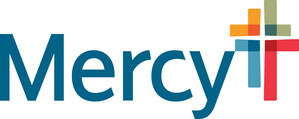ST. LOUIS, March 27, 2024 /PRNewswire/ -- Mike Valenti's girlfriend may have saved his life. Approaching her own retirement, she used her remaining flex spending money to undergo a multi-cancer early detection test, a simple blood draw offered through Mercy that can detect up to 50 different cancers. While her test came back all clear, she suggested Valenti sign up to have it done.
"I signed up and went the next week on a whim," 63-year-old Valenti said. "When the results came back, it showed possible head and neck cancer. I was shocked and thought it could have been a false positive."
Mercy Center for Precision Medicine Nurse Navigator Ashley Wiseman called Valenti with his results and led him through the next steps. She helped schedule a CT scan and an appointment with Dr. James Martin, a Mercy ear, nose and throat doctor.
The results were confirmed – Valenti had stage 2 tonsil cancer, the most common type of oropharyngeal cancer which most frequently occurs in men over the age of 50. Symptoms can include a lump in the neck, a sore in the back of the mouth that won't heal, blood in saliva, mouth pain, one tonsil larger than the other, a persistent sore throat, ear pain, difficulty swallowing, speaking or chewing and even bad breath.
"I had no symptoms of anything before taking the test," Valenti said. "It was the best 950 bucks I ever spent!"
According to the American Cancer Society, men have a 1 in 60 chance of developing tonsil cancer in their lifetime. It's often linked to tobacco use and heavy alcohol consumption, though recent research confirms human papilloma virus (HPV) is playing an increasingly significant role in its development.
Valenti never used tobacco and was told his tonsil cancer was caused by HPV, which has a better survival rate of 85% to 90% since it was caught early and hadn't spread. As with most cancers, outcomes are not as good at stages 3 and 4.
Once Dr. Martin confirmed the diagnosis, Valenti was connected with Dr. Shawn Hu, a medical oncologist, for six to eight chemotherapy treatments at Mercy Hospital St. Louis, and Dr. Jenny Shaffer, a radiation oncologist, for 35 radiation treatments at Mercy South, only a mile from his home.
Valenti finished treatments in August and will have CT scans every three months to ensure there is no recurrence.
"People should seriously consider spending the money to have this test done," Valenti said. "I feel fortunate I took it and caught this before I got worse. It probably saved my life."
Mercy, one of the 20 largest U.S. health systems and named the top large system in the U.S. for excellent patient experience by NRC Health, serves millions annually with nationally recognized care and one of the nation's largest and highest performing Accountable Care Organizations in quality and cost. Mercy is a highly integrated, multi-state health care system including more than 50 acute care and specialty (heart, children's, orthopedic and rehab) hospitals, convenient and urgent care locations, imaging centers and pharmacies. Mercy has over 900 physician practice locations and outpatient facilities, more than 4,500 physicians and advanced practitioners and 50,000 co-workers serving patients and families across Arkansas, Kansas, Missouri and Oklahoma. Mercy also has clinics, outpatient services and outreach ministries in Arkansas, Louisiana, Mississippi and Texas. In fiscal year 2023 alone, Mercy provided more than half a billion dollars of free care and other community benefits, including traditional charity care and unreimbursed Medicaid.
SOURCE Mercy

WANT YOUR COMPANY'S NEWS FEATURED ON PRNEWSWIRE.COM?
Newsrooms &
Influencers
Digital Media
Outlets
Journalists
Opted In




Share this article